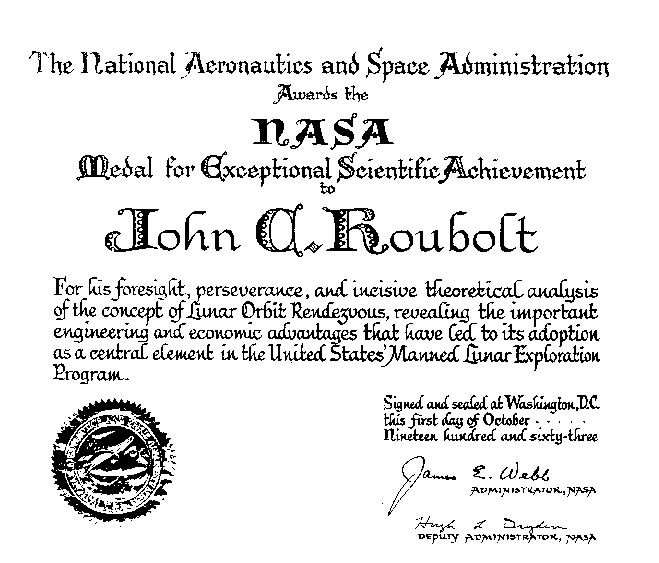 |
|
Brown's Lunar Exploration Working Group Michael's Paper on a "Parking Orbit" The Feelings Against Lunar-Orbit Rendezvous The Space Task Group's Early Skepticism President Kennedy's Commitment Houbolt's First Letter to Seamans
|
Conclusion
Whether NASA's choice of the LOR concept would have been made in the summer of 1962 or at any other later time without the research information, commitment, and crusading zeal of Houbolt remains a matter for historical conjecture. His basic contribution, however, and that of his associates who in their more quiet ways also developed and advocated LOR, seems now to be beyond debate. They were the first in NASA to recognize the fundamental advantages of the LOR concept, and for a critical period in the early 1960s, they also were the only ones inside the agency to foster it and fight for it. The story of the genesis of the LOR concept thus testifies to the essential importance of the single individual contribution even within the context of a large organization based on teamwork. It also underscores the occasionally vital role played by the unpopular and minority opinion. Sometimes one person alone or a small group of persons may have the best answer to a problem. And those who believe passionately in their ideas must not quit, even in the face of the strongest opposition or pressures for conformity. Thousands of factors contributed to the ultimate success of the Apollo lunar landing missions, but no single factor was more essential than the concept of LOR. Without NASA's adoption of this stubbornly held minority opinion in 1962, the United States may still have reached the Moon, but almost certainly it would not have been accomplished by the end of the 1960s, President Kennedy’s target date. One can take this "what-if" scenario even further. Without LOR, it is possible that no one even now—near the beginning of the twenty-first century—would have landed on the Moon. No other way but LOR could solve the landing problems. No less of an authority than George Low has expressed this same judgment. "It is my opinion to this day," Low wrote in 1982, "that had the Lunar Orbit Rendezvous Mode not been chosen, Apollo would not have succeeded." All of the other modes "would have been so complex technically, that there would have been major setbacks in the program, and it probably would have failed along the way." Low also believed that without "John Houbolt's persistence in calling this method to the attention of NASA's decision makers" and "without Houbolt's letter to Seamans (and the work that backed up that letter)," NASA "might not have chosen the Lunar Orbit Rendezvous Mode." Houbolt's commitment was a key factor in the adoption of LOR and was "a major contribution to the success of Apollo and, therefore, to the Nation."127 At 4:17 p.m. (eastern daylight time) on 20 July 1969, John Houbolt, by then a senior consultant with the innovative Aeronautical Research Associates of Princeton, New Jersey, sat inconspicuously as one of the "nest" of invited guests and dignitaries in the viewing room of Mission Control at the Manned Spacecraft Center in Houston. Like so many others around the world at that moment, he listened in wonder to the deliberately spoken, yet wildly dramatic words of Apollo 11 astronaut Neil Armstrong: "Houston, Tranquility Base here. The Eagle has landed." If one ever needed some final confirmation of the importance of Houbolt's role in the selection of LOR as the mission mode for Apollo, it would come here, during the alternate cheering and shushing of that precious moment, when Americans landed and stepped on the Moon for the first time. Turning from his seat, NASA's master rocketeer, Wernher von Braun, found Houbolt's eye among all the others, gave him the okay sign, and said to him simply, "John, it worked beautifully." Houbolt was speechless at what would be the greatest moment in his professional life—not to mention one of the greatest moments in the life of the entire human community. But the crusader was thinking: "By golly, the world ought to stop right at this moment."128 The righteousness of his cause had been justified.
|
|
|
|
